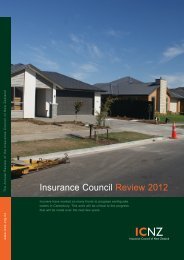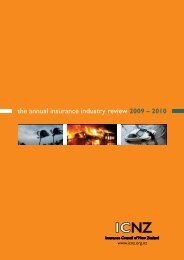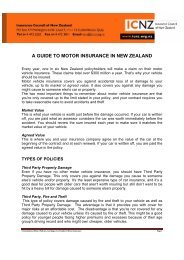Download - Insurance Council of New Zealand
Download - Insurance Council of New Zealand
Download - Insurance Council of New Zealand
Create successful ePaper yourself
Turn your PDF publications into a flip-book with our unique Google optimized e-Paper software.
“Cantabrians and <strong>New</strong> <strong>Zealand</strong>ers have<br />
been courageous, resilient, patient and<br />
strong. We understand and share many<br />
<strong>of</strong> their current frustrations, and as an<br />
industry are committed to doing all we<br />
can to help make progress.”<br />
The impact <strong>of</strong> the earthquakes is that there has been<br />
a fundamental and permanent shift in the insurance<br />
market. The way in which earthquake risks are insured<br />
has changed forever. An example <strong>of</strong> this is the approach<br />
to older buildings, particularly those with unreinforced<br />
masonry, which are now more difficult to insure for<br />
replacement cover throughout <strong>New</strong> <strong>Zealand</strong>. Many risks<br />
will be unable to attract full insurance cover, and this<br />
development will require collective dialogue between<br />
banks, government, insurers and business groups, to<br />
ensure that economic growth continues in earthquake<br />
prone regions.<br />
A major challenge going forward is to find a good balance<br />
between building standards and cost effectiveness.<br />
Excessive standards will lead to restricted development,<br />
whereas inadequate standards will simply perpetuate<br />
the challenges we have faced in Canterbury where<br />
many buildings and houses have been shown to have<br />
inadequate foundations or design for the conditions.<br />
The cost <strong>of</strong> insurance has risen dramatically and is likely<br />
to continue increasing as the costs <strong>of</strong> the earthquake<br />
claims rise. Residential properties have not been impacted<br />
as severely as Commercial but, in general, insurers<br />
are charging significantly more, and the Earthquake<br />
Commission levy tripled from 1 February 2012.<br />
Most insurers appear to be moving away from<br />
percentage <strong>of</strong> loss deductibles to percentage <strong>of</strong> insured<br />
value deductibles for earthquake, and the levels <strong>of</strong><br />
deductibles on many commercial properties have risen.<br />
The impact on the cost and availability <strong>of</strong> reinsurance<br />
is major. Catastrophe reinsurers around the world have<br />
experienced an abnormally costly 2011 with significant<br />
floods in Brisbane, the Canterbury earthquakes, Japan’s<br />
tsunami and earthquake, and the Thai floods. The<br />
catastrophe reinsurance modellers are likely to begin<br />
to review their models for <strong>New</strong> <strong>Zealand</strong> risk in the<br />
next year or two. This could see a further round <strong>of</strong><br />
earthquake insurance cost increases.<br />
3<br />
There will be other changes which will impact the<br />
market as we learn the lessons from Canterbury. These<br />
include issues <strong>of</strong> under-insurance, open-ended covers,<br />
outdated valuations, insufficient Business Interruption<br />
indemnity periods and insufficient business continuity<br />
planning. We, as an industry, will be looking to our<br />
broker colleagues to assist us in the <strong>Insurance</strong> <strong>Council</strong><br />
highlighting the increased need for scrutiny in these areas.<br />
Despite the challenges <strong>of</strong> the earthquake, the <strong>Insurance</strong><br />
<strong>Council</strong> and the insurance industry have been required<br />
to carry out their normal daily work. In <strong>New</strong> <strong>Zealand</strong><br />
the <strong>Insurance</strong> <strong>Council</strong> has again been leading the<br />
debate on insurance and has continued creating a better<br />
understanding <strong>of</strong> the economic and social value <strong>of</strong> our<br />
industry to a successful <strong>New</strong> <strong>Zealand</strong>.<br />
The <strong>Council</strong> has maintained a strong and positive<br />
relationship with the government throughout the<br />
catastrophe recovery period, and also has seen<br />
its relationship with the Opposition, particularly<br />
local Canterbury MPs, built to a very positive<br />
level. Where there are clear differences <strong>of</strong> opinion<br />
between the government and the <strong>Council</strong>, we have<br />
sought to engage constructively in expressing<br />
our concerns. However, looking towards the<br />
remainder <strong>of</strong> 2012 and beyond, we will continue<br />
to build and maintain a strong, constructive and<br />
open relationship with the government on issues<br />
<strong>of</strong> wider concern to our members, and also in the<br />
continued recovery <strong>of</strong> the Canterbury region.





